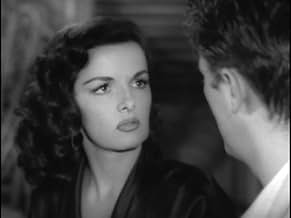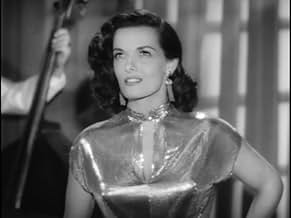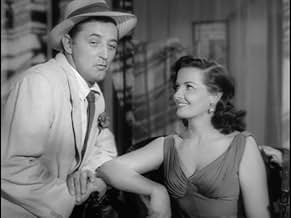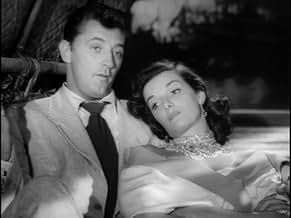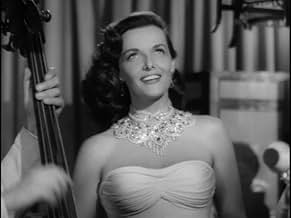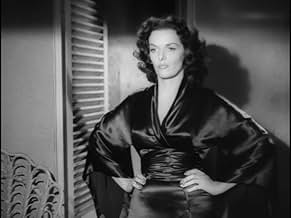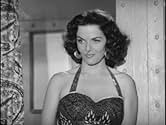CALIFICACIÓN DE IMDb
6.6/10
4.1 k
TU CALIFICACIÓN
Nick Cochran, un estadounidense exiliado en Macao, tiene la oportunidad de limpiar su nombre ayudando a capturar a un criminal internacional.Nick Cochran, un estadounidense exiliado en Macao, tiene la oportunidad de limpiar su nombre ayudando a capturar a un criminal internacional.Nick Cochran, un estadounidense exiliado en Macao, tiene la oportunidad de limpiar su nombre ayudando a capturar a un criminal internacional.
- Dirección
- Guionistas
- Elenco
Abdullah Abbas
- Arabian
- (sin créditos)
Rico Alaniz
- Bus Driver
- (sin créditos)
Trevor Bardette
- Alvaris
- (sin créditos)
Genevieve Bell
- Woman Passenger
- (sin créditos)
George Blagoi
- Casino Patron
- (sin créditos)
Truman Bradley
- Narrator
- (voz)
- (sin créditos)
George Chan
- Chinese Photographer
- (sin créditos)
Spencer Chan
- Hood
- (sin créditos)
Suey Chan
- Casino Patron
- (sin créditos)
Opiniones destacadas
Cheeky, compact crime-drama in an exotic locale off the southern coast of China. Former Army Lieutenant Robert Mitchum, on the run from the law, winds up in the gambling and jewel-smuggling town of Macao without his wallet--seems pack-up-and-go lounge singer Jane Russell has fleeced him on the boat coming over from Hong Kong! Luckily, Mitchum becomes friendly with 'salesman' William Bendix, who is actually working to bring in the crime boss responsible for the death of an international police officer. Very tight and entertaining piece doesn't waste any time getting started. Some of the sloppy editing in the early stages fails to shape the scenes, but director Josef von Sternberg makes up for this with quick pacing and colorful asides. As for Russell, she's a stitch either working some very sarcastic dialogue or warbling seductive tunes down at the local gambling house. Gloria Grahame, as the boss's girl, wants Jane outta town fast--and it's easy to see why! *** from ****
Josef von Sternberg began Macao (and copped the directorial credit), but Nicholas Ray finished it. Nonetheless, it abounds with Sternberg's branded flounces and fetishes. As in Shanghai Express and The Shanghai Gesture, he trowels on the Orientalism in thick impasto (Sternberg could have made the best Charlie Chan movie of them all).
A nighttime chase through the Macao docks opens the movie (to be rhymed near its conclusion): A white-suited European is pursued by knife-throwing Chinese thugs; he falls in the water when one blade finds its mark. A badge filched from him pocket shows him to be a police detective.
Into this world of Asian intrigue sails a boat from Hong Kong, just 35 miles up the coast. On it is the motley crew of salesman William Bendix, drifter Robert Mitchum and mysterious woman Jane Russell, who lifts Mitchum's wallet. Sans passport, Mitchum comes to the attention of the Macao police chief (Thomas Gomez), who reports the suspicious stranger to gambling kingpin Brad Dexter. Dexter assumes Mitchum is a cop he knows to be on his way to extradite him back to Hong Kong....
It's a playfully plotted adventure story. Russell gets a gig singing at Dexter's club in eye-popping gowns which actually aren't any more provocative than the black-and-white daytime outfits she traipses around in, wielding a parasol. She fares better than Gloria Grahame, as Dexter's moll, looking washed out and largely wasted (though she puts her distinctive spin on a couple of lines). Mitchum by this time has done this role the lippy but laconic reluctant hero so often he could do it in his sleep, which, given his hooded eyes, may be the truth of the matter.
Macao is an utterly shallow film done with energy and style. The plotting remains perfunctory, but the play of shadows throughout remains transfixing especially in the set-piece near the end, again on the dark waterfront, with ropes and nets casting their creepy spell. And the movie provides Russell with one of her few opportunities to flaunt her real, if narrow, talents: in addition to the statuesque figure that caught Howard Hughes' eye, she had spunk and sass. That's what Sternberg saw, and he fell for it. We do, too.
A nighttime chase through the Macao docks opens the movie (to be rhymed near its conclusion): A white-suited European is pursued by knife-throwing Chinese thugs; he falls in the water when one blade finds its mark. A badge filched from him pocket shows him to be a police detective.
Into this world of Asian intrigue sails a boat from Hong Kong, just 35 miles up the coast. On it is the motley crew of salesman William Bendix, drifter Robert Mitchum and mysterious woman Jane Russell, who lifts Mitchum's wallet. Sans passport, Mitchum comes to the attention of the Macao police chief (Thomas Gomez), who reports the suspicious stranger to gambling kingpin Brad Dexter. Dexter assumes Mitchum is a cop he knows to be on his way to extradite him back to Hong Kong....
It's a playfully plotted adventure story. Russell gets a gig singing at Dexter's club in eye-popping gowns which actually aren't any more provocative than the black-and-white daytime outfits she traipses around in, wielding a parasol. She fares better than Gloria Grahame, as Dexter's moll, looking washed out and largely wasted (though she puts her distinctive spin on a couple of lines). Mitchum by this time has done this role the lippy but laconic reluctant hero so often he could do it in his sleep, which, given his hooded eyes, may be the truth of the matter.
Macao is an utterly shallow film done with energy and style. The plotting remains perfunctory, but the play of shadows throughout remains transfixing especially in the set-piece near the end, again on the dark waterfront, with ropes and nets casting their creepy spell. And the movie provides Russell with one of her few opportunities to flaunt her real, if narrow, talents: in addition to the statuesque figure that caught Howard Hughes' eye, she had spunk and sass. That's what Sternberg saw, and he fell for it. We do, too.
A fast-moving tale of foreign intrigue set in the port of Macao, on the south coast of China, across the Pearl River Delta from Hong Kong. The convoluted plot involves three newcomers to the region, Robert Mitchum's ex-serviceman on the run out east on account of some domestic trouble back in New York, Jane Russell as a similarly nomadic nightclub singer, looking for a fresh start after a series of failed love affairs and William Bendix as an enthusiastic travelling salesman. However their arrival off the boat is being watched by the local chief of police, who is in the pocket of American crime-boss Brad Dexter who suspects that Mitchum is an undercover cop out to lure him beyond the three mile zone protecting him in Macao.
Dexter has a girlfriend, played by Gloria Grahame, who becomes jealous of Russell after he employs Russell as a singer, but also so that he can keep tabs on Mitchum. The plot thickens as Mitchum and Russell fall for each other, the real cop is revealed and a ploy involving stolen jewellery is instigated to bring Dexter to Hong Kong where he can finally be arrested. After an exciting foot-chase around the dark, deserted docks involving Mitchum and a couple of Dexter's knife-wielding Chinese henchmen, the denouement takes place on Dexter's boat climaxing in a roughhouse fist-fight between Dexter and Mitchum and a reconciliation between Mitchum and Russell which gives Mitchum a cheeky, risqué closing line before the end titles.
The film was a return to Hollywood film-making by Dietrich's celebrated German director of the 30's, Josef Von Sternberg, after a gap of several years and his stylised technique of lighting is evident especially in the night time scenes, although Nicholas Ray, then married to Grahame, was reportedly called in to finish the shoot after Von Sternberg was fired from the production.
The film packs a lot of plot into its eighty minute running time and still finds time to allow Russell to sing a few numbers, notably "You Kill Me" (great name for a torch song) and "One For My Baby" which Sinatra would later make his own. Mitchum and Russell bring their own respective brands of vulnerable machismo and sultry sassiness to their parts as well as the heat in their scenes together. Grahame however seems disinterested in her part but Bendix and Dexter are more convincing as the real protagonists way out east.
An enjoyably entertaining Oriental adventure, what it lacks in budget, it makes up for in style and the charisma of its two undeniably magnetic leads.
Dexter has a girlfriend, played by Gloria Grahame, who becomes jealous of Russell after he employs Russell as a singer, but also so that he can keep tabs on Mitchum. The plot thickens as Mitchum and Russell fall for each other, the real cop is revealed and a ploy involving stolen jewellery is instigated to bring Dexter to Hong Kong where he can finally be arrested. After an exciting foot-chase around the dark, deserted docks involving Mitchum and a couple of Dexter's knife-wielding Chinese henchmen, the denouement takes place on Dexter's boat climaxing in a roughhouse fist-fight between Dexter and Mitchum and a reconciliation between Mitchum and Russell which gives Mitchum a cheeky, risqué closing line before the end titles.
The film was a return to Hollywood film-making by Dietrich's celebrated German director of the 30's, Josef Von Sternberg, after a gap of several years and his stylised technique of lighting is evident especially in the night time scenes, although Nicholas Ray, then married to Grahame, was reportedly called in to finish the shoot after Von Sternberg was fired from the production.
The film packs a lot of plot into its eighty minute running time and still finds time to allow Russell to sing a few numbers, notably "You Kill Me" (great name for a torch song) and "One For My Baby" which Sinatra would later make his own. Mitchum and Russell bring their own respective brands of vulnerable machismo and sultry sassiness to their parts as well as the heat in their scenes together. Grahame however seems disinterested in her part but Bendix and Dexter are more convincing as the real protagonists way out east.
An enjoyably entertaining Oriental adventure, what it lacks in budget, it makes up for in style and the charisma of its two undeniably magnetic leads.
Nick Cochran, supposedly an American adventurer and petty criminal, arrives, short of cash and on the run from the United States where he is wanted, in Macao (at this period still a Portuguese colony). Arriving on the same boat is an attractive young woman named Julie Benson. Julie is hired by Vincent Halloran, the local gambling boss, as a singer in his casino-cum-nightclub. Halloran is also wanted in America (for offences far more serious than Cochran's), but cannot be extradited as long as he remains in Macao. Although this is a short film, there is still time enough for the plot to become very complex. A number of the characters are not what they seem. Is Cochran, for example, what he purports to be, or is he really a cop trying to lure Halloran beyond Macao's three mile limit into international waters where he can be arrested? Who is Lawrence Trumble, the mysterious salesman who also appears to have a sideline in stolen jewellery?
This is the second film which Robert Mitchum and Jane Russell made together; the previous year they had starred in "His Kind of Woman". The two films have much in common beyond the two leading actors. Both have an exotic setting and both feature gambling and a ruthless gangster. The two leads play similar types in both films, Mitchum a seedy, down-on-his-luck character, likable despite his shady past and occasionally cynical exterior, and Russell a sultry glamour girl. There is, however, an important difference between the two films. "His Kind of Woman" can be seen as a comic send-up of the crime thriller genre, starting off in the dark, menacing film noir style and then metamorphosing into a comedy action-thriller. "Macao" is the genuine article rather than a parody, being for the most part played seriously rather than for laughs, although it the atmosphere is perhaps lighter than in some other films noirs. The difference lies less in the look of the film- "Macao" has some striking black-and-white photography- than in the moral atmosphere. Films such as the Humphrey Bogart classics "The Maltese Falcon" and "The Big Sleep" were notable not only for their dark, gloomy look but also for their tone of moral darkness. The private eye characters played by Bogart struggle to maintain their private integrity in a world of corruption and deceit. In "Macao" there is something closer to a traditional morality, with good triumphing over the evil of the ruthless villains. The result is perhaps something of a hybrid between authentic noir and a more traditional adventure thriller, still highly watchable even today. 6/10
This is the second film which Robert Mitchum and Jane Russell made together; the previous year they had starred in "His Kind of Woman". The two films have much in common beyond the two leading actors. Both have an exotic setting and both feature gambling and a ruthless gangster. The two leads play similar types in both films, Mitchum a seedy, down-on-his-luck character, likable despite his shady past and occasionally cynical exterior, and Russell a sultry glamour girl. There is, however, an important difference between the two films. "His Kind of Woman" can be seen as a comic send-up of the crime thriller genre, starting off in the dark, menacing film noir style and then metamorphosing into a comedy action-thriller. "Macao" is the genuine article rather than a parody, being for the most part played seriously rather than for laughs, although it the atmosphere is perhaps lighter than in some other films noirs. The difference lies less in the look of the film- "Macao" has some striking black-and-white photography- than in the moral atmosphere. Films such as the Humphrey Bogart classics "The Maltese Falcon" and "The Big Sleep" were notable not only for their dark, gloomy look but also for their tone of moral darkness. The private eye characters played by Bogart struggle to maintain their private integrity in a world of corruption and deceit. In "Macao" there is something closer to a traditional morality, with good triumphing over the evil of the ruthless villains. The result is perhaps something of a hybrid between authentic noir and a more traditional adventure thriller, still highly watchable even today. 6/10
Hooray, Hollywood had the good sense to pair up Robert Mitchum and Jane Russell in another movie! After the sizzling magic between them in His Kind of Woman, they made Macao, which is incredibly similar and also very entertaining.
Added into this one-which is not a sequel, by the way, even though it's similar-are two sidekicks: William Bendix always adds character to a cast, and Gloria Grahame tries to take Bob away from Jane. Sorry, Gloria, but when Jane and Bob are together, there's just no stopping them. They banter, but there's something sweet underneath it all, showing that although both stars are big and tough, they'll always find time for romance. And, since they were lifelong friends, it helps knowing they had fun filming together!
Instead of Mexico, the leads are transported to China, but there's still intrigue, mystery, action, and fun quips mixed in amongst the romance. It's hard to decide whether His Kind of Woman or Macao is better; give them a whirl and try to decide for yourself!
Added into this one-which is not a sequel, by the way, even though it's similar-are two sidekicks: William Bendix always adds character to a cast, and Gloria Grahame tries to take Bob away from Jane. Sorry, Gloria, but when Jane and Bob are together, there's just no stopping them. They banter, but there's something sweet underneath it all, showing that although both stars are big and tough, they'll always find time for romance. And, since they were lifelong friends, it helps knowing they had fun filming together!
Instead of Mexico, the leads are transported to China, but there's still intrigue, mystery, action, and fun quips mixed in amongst the romance. It's hard to decide whether His Kind of Woman or Macao is better; give them a whirl and try to decide for yourself!
¿Sabías que…?
- TriviaJane Russell reports that director Josef von Sternberg was nasty to the crew, and would make insulting remarks about her and Robert Mitchum to each other, such as "what are we going to do with this beautiful stupid girl." Although Sternberg threatened Mitchum that he could be put off the picture, in the end it was the director who was replaced by Nicholas Ray.
- ErroresThe photographer hands the developed photos to the police within five minutes of taking them. There was no technology like that in 1950.
- Citas
Lt. Sebastian: [referring to Julie Benson] Besides her obvious talents, she also sings.
- ConexionesFeatured in Hollywood the Golden Years: The RKO Story: Howard's Way (1987)
- Bandas sonorasOcean Breeze
Music by Jule Styne
Lyrics by Leo Robin
Sung by Jane Russell (uncredited)
Played on phonograph
Selecciones populares
Inicia sesión para calificar y agrega a la lista de videos para obtener recomendaciones personalizadas
- How long is Macao?Con tecnología de Alexa
Detalles
Taquilla
- Total a nivel mundial
- USD 3,530
- Tiempo de ejecución1 hora 21 minutos
- Color
- Relación de aspecto
- 1.37 : 1
Contribuir a esta página
Sugiere una edición o agrega el contenido que falta

Principales brechas de datos
By what name was Macao (1952) officially released in Canada in French?
Responda


